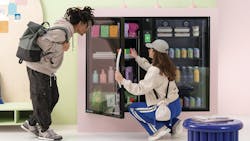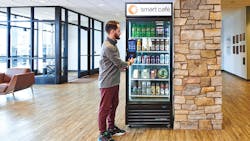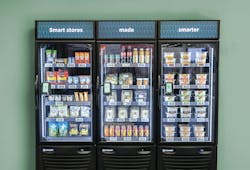At the 2024 NAMA Show in Dallas in early May, smart coolers were a popular topic of conversation among operators. What makes a cooler smart?
“I would define a smart cooler as a system that can manage its own inventory, sales and take payments, which funny enough, sounds a lot like a vending machine,” said Evan Jarecki, co-founder of Gimme, an industry software company that builds management, delivery and invoicing tools for micro markets and vending operators.
Unlike vending, noted Jarecki, smart coolers can mitigate theft using weight sensors or video technology, and customers can touch and inspect their selection before they make the purchase.
“I do believe they are a game changer for the industry right now,” Jarecki added. “They combine the best of markets and the best of vending. It allows the product variety of a market and the security of a vending machine. Those are two challenges that continue to pop up in vending locations and for micro markets.”
Not surprisingly, the buzz surrounding smart coolers and markets has created a new landscape for operators. They now have numerous options when it comes to selecting these smart devices, a fact that was evident on the convention floor at the 2024 NAMA Show.
Smart coolers are the solution
Ryan McWhirter, vice president of product development at 365 Retail Markets, a smart cooler manufacturer, said the competition will be healthy for the industry. He expects to see more smart coolers and markets available in the future. “Having attended Vend Italia in Milan, Italy, right after NAMA, we know that for every smart cooler here in the USA, there are five in Europe. It’s clear from the conversations we have with operators that they are yearning for the perfect marriage of markets and vending to increase same-store sales and reach. Smart coolers are the solution,” he said.
365 Retail Markets introduced its PicoCooler in 2020, which McWhirter said the company likes to lovingly call their “dumb cooler.” That was followed by PicoCooler Breeze one year later, which used weighted shelves to detect product movement. “Everything changed with Stockwell, our first computer vision solution launched at NAMA 2022 in Chicago,” McWhirter said. “Then this year, we launched PicoCooler Vision, another step in our incremental innovation that builds on the past to create the best solution for operators.”
AI technology adds virtual operator vision
“Our Smart Cafe is, I'd say, the next level of advancement in technology and is a seamless consumer experience. When they walk up to the unit, they have a 10-inch tablet where they can browse the planogram if they want to view items before they actually grab them. Otherwise, they just tap their card to start the transaction. The unit unlocks automatically and then it uses those AI cameras to know exactly what's coming in and out of the cooler,” Steiner explained. “What's really cool is if I put an item back in the wrong spot, it doesn't matter because Smart Cafe knows that the item went back inside the unit regardless of where it was placed. Once I grab all my items, I close the door, it waits a couple seconds, then it locks. Once it locks, it shows me all the items on the screen that I've removed and it charges my card automatically,” she added.
Steiner said the Smart Café is currently being tested by several operators and will be readily available by fall, through either direct purchase from Cantaloupe, or from a reseller like AVS, who integrates Cantaloupe’s technology, along with others, onto their coolers.
Navigating the landscape
Tom Vogt, vice president of sales at AVS Companies, said his company is well-positioned to help operators navigate the changing landscape and the multiple smart choices that are now available. “Most of our sales team have been on the operator side at one point or another in their life,” said Vogt. “Our team can absolutely help an operator understand which market solution is the right choice. Our sweet spot is the complete solution. When a customer needs to put together a market, they have to source their cooler, their fixtures, their glides, everything that goes into a micro market, including the right technology choice.”
A packaged smart-store approach
Yu said his company offers a plug-and-play AI-driven smart market solution that uses what he called “hybrid digital sensors” within a modular design that offers refrigerated, frozen, ambient and hot food products, digital price tags, a payment solution and digital ad displays.
“Most operators just want something plug-and-play. They want something that makes money and just works. Technology is great, but it needs to be transparent. It needs to be invisible to the consumer. So, we want it to bring something that is invisible to the consumer but very easy to use for the operator,” Yu said. “The Micromart solution to an operator is literally a smart store that someone can purchase, plug it in, upload their product list, and they can get up and running the next day. Everything is included, including the smart coolers.”
Yu added that Micromart is especially focused on offering quality hot food selections by providing heating towers as part of the system, and induction heaters that heat up and cool down quickly. His company has seen success sourcing meals from a local provider to use with Micromart and generating significant revenue that would normally be lost to food delivery services.
A smart market via weight sensors
Weight sensors in smart coolers and markets is another option for operators. As a co-founder of Redbox in 2002, Mike DeLazzer knows a thing or two about unattended retail and scaling a company with multiple products. Now, as a co-founder of Instant Systems USA, which uses a weigh-sensor approach, DeLazzer has been distributing his smart systems to Selecta, a European company. “They currently have about 4,000 locations where they are using our equipment. Here in the U.S., we just started to deploy units as of last year,” said DeLazzer. “These systems are extremely accurate.”
“The one that has the most traction is our 600 cooler, and we always basically put them in a two-door configuration so that you can do cold and ambient in with the same user interface. You can also do cold and frozen, and we're developing a hot hold unit,” he explained.
A small-store shopping experience
Israel-based Shekel has been doing global weight solutions for the last 50 years. Guy Moshe, the company’s chief technology officer, said Shekel allows operators to offer a great small-store shopping experience not only in trust-based locations but in more public locations with Shekel’s AI security system. “Shoppers can take products, browse them, look in the ingredients, return them if they don't want, and with Shekel’s product-aware technology, you can see all of that in real time, what they have been charged for, what they took, what they are returning,” Moshe said.
“We have our cooler that is built all around the solution. Not only the weight kit but also the system integration and the screen — and everything attached to the whole smart cooler operation,” Moshe explained. “We are leveraging the raw data of our sensors to generate a unique weight signature for every SKU in the system. So basically, we can differentiate between the weight signature of very similar products such as Coke and Fanta.”
Moshe believes the market for smart coolers such as Shekel’s, which are currently available in the United States, is huge. “We're seeing strong demand, and we plan to fulfill this with hundreds of units by the end of this year,” he said.
Combining weight sensors and video
Fred Kahn, a co-founder and CEO of Kooick, said his AI-driven smart market system is different from the others on the market, combining weight sensors and video. “You have weight only, you have video only, and the video only tends to be cameras that are on the door frames that are looking at products, either on the diagonal or horizontally as they go in and as they come out of the system. What we've done is we've combined static cameras, video cameras, and weight in a way where the system has a lot of accuracy as a result and redundancy as opposed to a single sensor solution.”
Unlike other weight systems, Kahn said that the video component allows the smart cooler to differentiate between brands such as Diet Coke and Coke, both in 20-ounce bottles. It’s early in the game for Kooick, currently engaging in pilot programs with operators, but Kahn notes that he’s working with Due North as his cooler supplier. He has 25 units ready to go with an eye on selling units in the first quarter of 2025.
Smart retail refrigeration
Due North is the cooler choice for many of the smart market developers. “We lead the industry in integration. It’s just the nature of our business, the way we look at things, we are typically the go-to for these solution providers to team up with to integrate their technology into our coolers and freezers,” said Randy Skyba, vice president of sales and marketing at Due North.
Skyba said the performance of smart coolers points to rapid growth. “Many of the machines that are out there and in the vending world, typically a lot of consumers will walk right by, they're not going to buy a sandwich from that vending machine,” Skyba said. Then you look at a cooler and for whatever reason, it has the persona that it is fresh, that it is current, and I'm more willing to look at and buy something from it. I think it's definitely replacing vending machines in a large way. Will it ultimately ever replace all vending machines? I don't know. Time will tell on that one.”
About the Author

Bob Tullio
Bob Tullio is a content specialist, speaker, sales trainer, consultant and contributing editor of Automatic Merchandiser and VendingMarketWatch.com. He advises entrepreneurs on how to build a successful business from the ground up. He specializes in helping suppliers connect with operators in the convenience services industry — coffee service, vending, micro markets and pantry service specifically. He can be reached at 818-261-1758 and [email protected]. Tullio welcomes your feedback.
Subscribe to Automatic Merchandiser’s new podcast, Vending & OCS Nation, which Tullio hosts. Each episode is designed to make your business more profitable.


